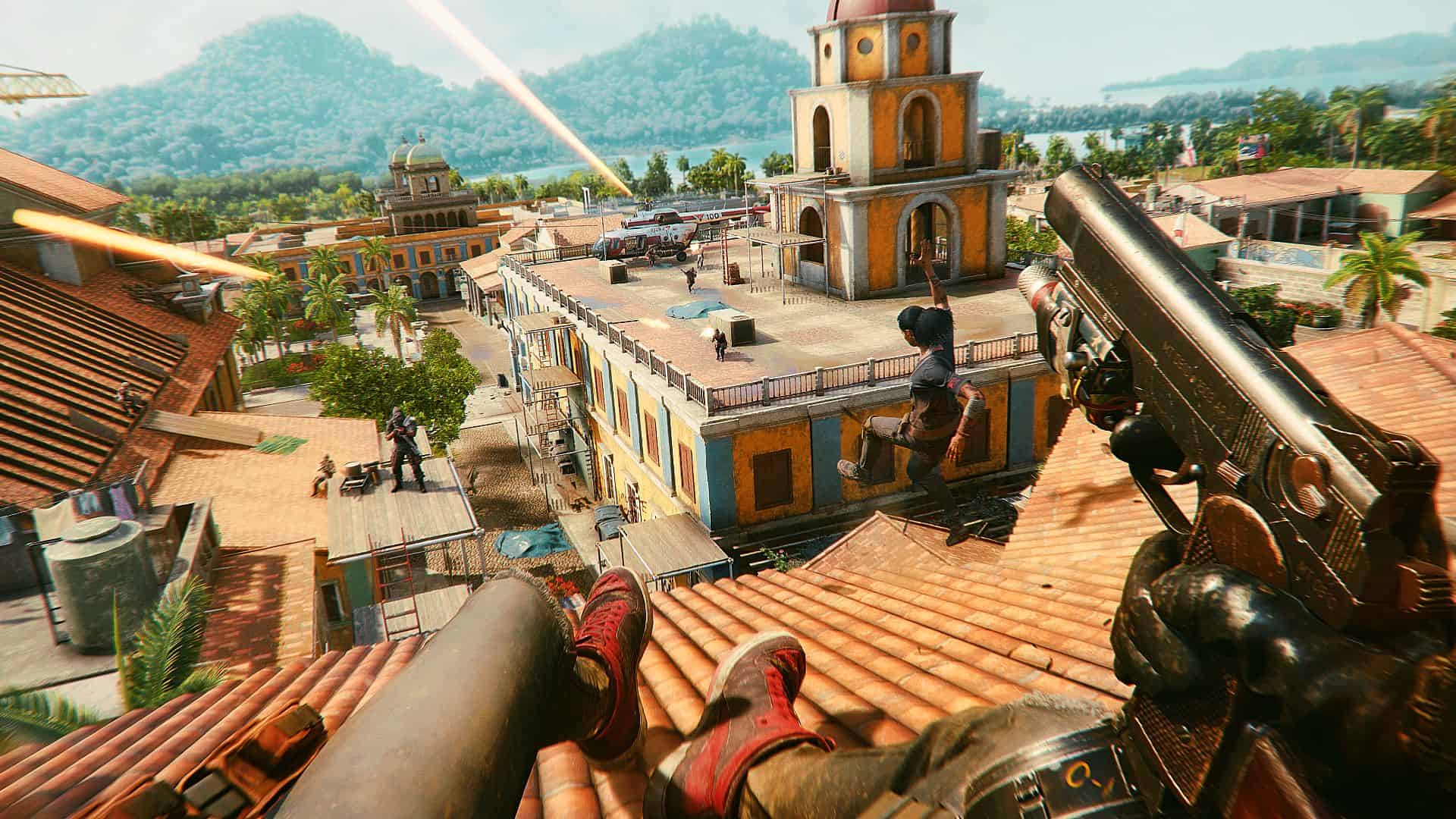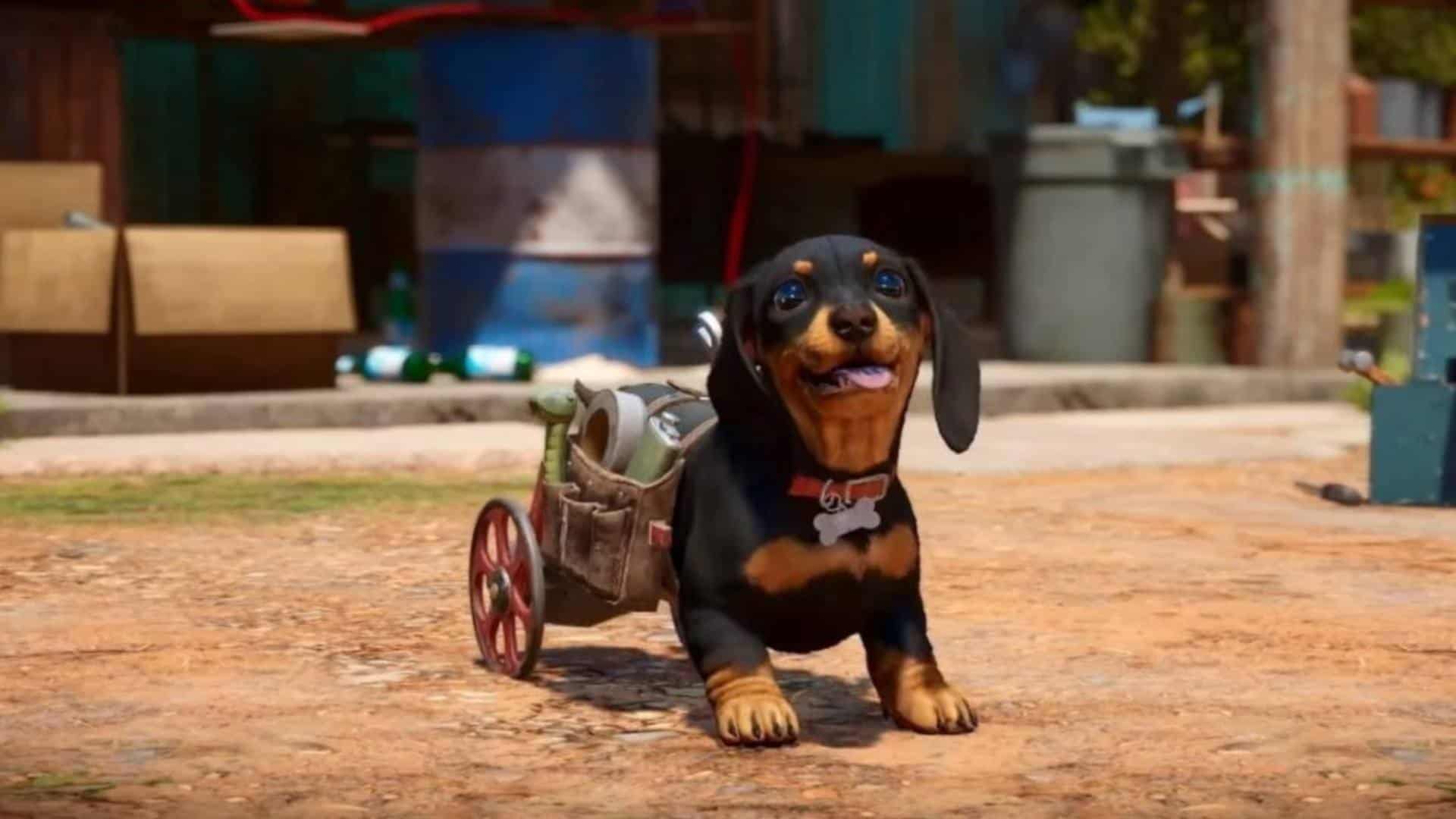You can trust VideoGamer. Our team of gaming experts spend hours testing and reviewing the latest games, to ensure you're reading the most comprehensive guide possible. Rest assured, all imagery and advice is unique and original. Check out how we test and review games here
In Far Cry 6, there are cars to race, helicopters to curl through the heavens, and guns to amass. There are cockfights, naturally, only this time with real cockerels, in a minigame that resembles a match of Tekken. There are animals for you to befriend, including a crocodile, called Guapo, who sports a jacket and can be gestured into battle; a dachshund, named Chorizo, whose hind legs haven’t so much failed him as provided him the opportunity for a wheely upgrade; and Oluso, a panther who slinks and slays from the shadows. There are treasure hunts on which to embark, people to meet, and a Cuba-flavoured paradise, called Yara, to explore. Oh, and there is also a fascist dictator, dressed in cream military fatigues, who sucks on the land as though it were a fine cigar—and damn the ashes. All in all, something of a romp.
That is the defining texture of these games: no matter the murk into which their characters are plunged, their days are a lark. Consider Jack Carver, the hero of the original, whose boat—and whose holiday—were blown to smithereens by an RPG, but who remained staunchly flower-shirted throughout. Or Jason Brody, who began Far Cry 3 by witnessing his brother’s murder but wound up setting a cannabis plantation alight, to the delicate strains of “Make It Bun Dem,” by Skrillex and Damian “Jr. Gong” Marley, while shouting “I love this thing!” in reference to his flamethrower. On reflection, the title of the series has less to do with its exotic locations—from rain-lashed jungle to freeze-dried peak—than with its proximity to tears.
Into this raw and itchy paradise is born Dani Rojas, who, after a stint in the military, decides—at first reluctantly, then with swelling hardihood—to join the guerillas, who resist the regime’s cruelty. This cruelty is established in the opening scene, wherein the streets are stormed by soldiers, people are rounded up for “processing” (we see a group lined up against a wall and shot) and Dani escapes, via boat, with a friend. However, when state troopers irrupt the boat, all the malevolence is poured into the person of Antón Castillo, the dictator in question, who is played, in likeness and in voice, by Giancarlo Esposito. As fans of Breaking Bad and The Mandalorian will attest, Esposito, with a glare of widening darkness and a glint of silver in his stubble, is the guy you get for menace. The trouble is, he has brought Star Wars in with him; he makes his entrance, belowdecks, like Darth Vader, backed by a white-clad brute, and begins monologuing. The moment he does, those early horrors are reduced to flourishes of Guignol in a performance of actorly malice. The game is so in love with its villain that it adopts his tactics: lives have not been lost, you feel, so much as forfeited to the cause of Castillo.
By the time he makes his exit, and the ship’s hull is perforated by machine-gun fire, any chance of gravitas has leaked out. Before long, we are introduced to Juan Cortez, a former KGB spymaster, so we are told, who “can build an ICBM from a goddamn ice-cube tray.” Sure enough, Cortez soon trains us in the art of whipping up weapons from scrap; “Nice! Now you’ve got your own supply of high-velocity war crimes,” he says, as we cast our own armour-piercing bullets. Chatting to Dani on a jetty, he speaks wistfully of the guerilla life. “Ambush, the smell of sulfur burning your nostrils,” he says. “It’s… it’s—” Before Dani finishes the thought: “It’s fun.”
This snagging of tone is a source of great irritation to some, who lament the series’ lack of political import. Personally, I’ve always considered the search for political import, in a franchise like Far Cry, akin to scouring the menu at McDonald’s for prose that might warrant nomination for the next Booker Prize. Mind you, not that you can wholly blame them. Ubisoft’s approach, from the second game onwards, has been to glance lightly at the trouble and trauma of history and apply a thin geopolitical gloss, to a blockbuster first-person shooter, that rubs and crumbles away in the first ten minutes. Of course, in that particular genre—where war crimes go with the territory but where high-velocity enjoyment isn’t always guaranteed—it’s worth asking whether or not Cortez is right. Our nostrils may burn with the smell of cynicism, but is it fun?
Well, for a time. The question is, how much time? Your level of enjoyment, for Far Cry 6, will, I suspect, depend on the time that has elapsed since your last dose. Mine was Far Cry Primal, the Stone Age spin-off of 2016. (It was telling how much the series’ appeal was sharpened, like a spear, by the setting; when you boil it down, the bones of Far Cry haven’t evolved all that much. The caves are still calling.) Even so, I was quickly benumbed to the pleasures on offer in Yara. The map-defogging towers are gone, and the skill tree is no more—you have all your abilities from the start. Only, rather than amping up the fun, this has the odd effect of flattening it out. I never felt as if I were making tangible progress, and numbers—which hover over your enemies’ heads, dictate your current rank and the strength of your gear, and stamp each region with a daunting, Don’t-Go-Here rating—are hardly a substitute.
I still miss the days when Far Cry was little more than a showcase for CryEngine, with a half-battened story flapping in the breeze behind it. In that sense, the real sequel to the first game is, in fact, the island-bound Crysis. Not that Far Cry 2, powered by the Dunia Engine, didn’t share in the revelling of oomph; its African wilderness was blitzed by haze, and it gave us the gift of fire, to be brushed and blown across the plains. Down in Yara, we get an archipelago jewelled with blue waters and a capital city, called Esperanza, of straitened passageways and wide-open roads. It’s all very beautiful, in a blank way, but the game’s structure steers you away from experimentation, and I had to remind myself, now and then, to explore. I would heartily recommend, to anyone craving a warm holiday, a flight in the Avispa Buzzer: a battered chair, with gas tanks mounted below and downward-gusting blades fixed to the front and rear, like a chopper that grew from a garage. It provides a moveable feast of vistas. Still, considering the game is £50—£60 on next-gen consoles—you might feel irked at paying enough for a real plane ticket and failing to feel the sun on your face.
The best reason to play Far Cry 6 is if you know you have a taste for its action—if you can see yourself dipping in and out for the next few months. The explosions are back, the forgettable N.P.C. allies are back, and the bases are back, to be captured by stealth or wealth of firepower. As one comrade says, “With you, they get my best guerilla without the politics and bulls***.” Indeed, though, unfortunately, there is still plenty of bulls*** to contend with. For my money the gunplay is far too chewy, with foes that lumber toward you like the Michelin Man, and what’s with all the health bars that we have to chisel down these days? It is as if the developers, at Ubisoft Toronto, were anxious that firefights might be doused all too quickly if bullets did their proper job; given that even minor checkpoint disputes, with one or two guards present, can billow into blazing provincial conflicts, they needn’t have worried.
As it happens, though I played for much longer, I had had more than my fill after the first four hours, with no desire to venture back in. Strange to tell, I mourn the very things—the scalable vantages, the unlockable skills—that Ubisoft has left behind for the sake of freshness. Stale though they might have gotten, there is a perverse comfort in their transferable ease. If I had my way, we would have left Far Cry behind long ago and merely sought a new canvas for its thrills. Imagine if Ubisoft had, instead of whisking us to Yara, pulled us into the cubicled misery of office work. I can see it now: Far Sigh, in which we attempt to avoid the gaze of a despot, climb the towers of our inbox, gradually upgrade the skill tree of our C.V., and, it goes without saying, try to resist the politics and bulls***.
Developer: Ubisoft Toronto
Publisher: Ubisoft
Available on: PlayStation 5 [reviewed on], PlayStation 4, Xbox Series X / S, Xbox One, PC, Google Stadia, Amazon Luna
Release Date: October 7, 2021
To check what a review score means from us, click here.
Far Cry 6
- Platform(s): Google Stadia, PC, PlayStation 4, PlayStation 5, Xbox One, Xbox Series S/X, Xbox Series X
- Genre(s): Action, Adventure, Shooter




